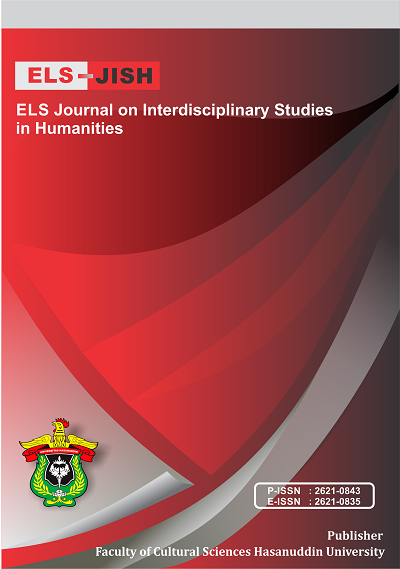Violence Against Children in the Novel 'Misteri Bilik Korek Api' by Ruwi Meita
DOI:
https://doi.org/10.34050/elsjish.v6i3.27909Keywords:
Child abuse, forms of violence, violenceAbstract
This study is driven by the dual objectives of comprehensively identifying and elucidating the diverse manifestations of violence against children within Ruwi Meita's novel "Misteri Bilik Korek Api" (The Mystery of the Matchbox Room).The selection of the theme of violence stems from the novel's portrayal of acts of violence directed towards children. To undertake a comprehensive analysis of these instances, this research employs a literary psychology approach, augmented by the conceptual framework provided by Azevedo and Viviane's typology of five distinct forms of violence. Employing a qualitative methodology, the study delves into the intricate fabric of the prose, facilitating an in-depth exploration and interpretation of the textual data. The outcomes of this inquiry illuminate five primary forms of violence that children undergo within the novel's narrative canvas: Indifference: Evidencing scenarios in which characters display an unsettling apathy towards the well-being of children. Contempt: Unveiling instances of disdain or disrespect aimed at children from other characters. Isolation: Illuminating instances where children are deliberately secluded or isolated from their social milieu. Rejection: Disclosing portrayals of children confronting exclusion or repudiation across various spheres of their existence. Terror: Exposing moments of intense fear and apprehension experienced by children as a result of threatening circumstances or actions.
References
Anggraeni, R. D. (2013). Dampak Kekerasan Anak Dalam Rumah Tangga. Repository Universitas Jember .
Andini, C. (2017). Children Emotion in The Movie" Big Hero 6 (Doctoral dissertation, Doctoral dissertation, Universitas Islam Negeri Alauddin Makassar).
Asy’ary, S. (2022). Kekerasan terhadap Anak. Jurnal Keislaman, 2(2), 178–194.
Azevedo, M. A., & Nogueira, V. (2008). Domestic Psychological Violence: Voice of Y outh. University Of Sao Paulo.
Dim, E. E. (2021). Experiences of physical and psychological violence against male victims in Canada: A qualitative study. International journal of offender therapy and comparative criminology, 65(9), 1029-1054.
Endraswara, S. (2013). Teori kritik sastra. Media Pressindo.
Erniwati, E., & Fitriani, W. (2020). Faktor-Faktor Penyebab Orang Tua Melakukan Kekerasan Verbal Pada Anak Usia Dini. Yaa Bunayya: Jurnal Pendidikan Anak Usia Dini, 4(1), 1-8.
Guedes, A., Bott, S., Garcia-Moreno, C., & Colombini, M. (2016). Bridging the gaps: a global review of intersections of violence against women and violence against children. Global health action, 9(1), 31516.
Jumiati, Rahman, F., Lewa, I., & Akhmar, A. M. (2022). The Potential of Children’s Literature in Educatioan and Environmental Ethics: Linguistic and Literary Approaches. In Proceedings of the 1st International Conference on Research in Social Sciences and Humanities (ICoRSH 2020).
Junaid, S., Ahmad, Nurhidayah, Mujizat, A., & Andini, C. (2023). The Quality of Human and Non-Human Relation in Indonesia and England Portrayed in the Selected Picture Books. ELS Journal on Interdisciplinary Studies in Humanities, 6(2), 211-218.
Lee, H. K. (2022). The AI Shape and Post-Human in Cultural Content. Specialusis Ugdymas, 1(43), 8675-8686.
Matravers, D. (2023). Empathy, Fiction, and Non-Fiction. In Empathy’s Role in Understanding Persons, Literature, and Art (pp. 158-173). Routledge.
Miles, M. B., & Huberman, A. M. (1994). Qualitative data analysis: An expanded sourcebook. sage.
Nuryanti, M., & Sobari, T. (2019). Analisis Kajian Psikologi Sastra Pada Novel “Pulang” Karya Leila S. Chudori. Parole: Jurnal Pendidikan Bahasa dan Sastra Indonesia, 2(4), 501-506.
Pereda, N., & Díaz-Faes, D. A. (2020). Family violence against children in the wake of COVID-19 pandemic: a review of current perspectives and risk factors. Child and adolescent psychiatry and mental health, 14(1), 1-7.
Qureshi, M. R., Ranjan, S., Rajkumar, R., & Shah, K. (2019). A simple approach to classify fictional and non-fictional genres. In Proceedings of the Second Workshop on Storytelling (pp. 81-89).
Rakhmad, W. N. (2016). 5. Kekerasan Terhadap Anak dalam Konstruksi Koran Tempo. Jurnal Ilmu Sosial, 15(1), 35-52.
Rianawati. (2015). Perlindungan Hukum Terhadap Kekerasan Pada Anak. Studi Gender dan Anak, GARUDA, 2.
Rahman, F. (2018). The Constraints of Foreign Learners in Reading English Literary Works: A Case Study at Hasanuddin University. Journal of Arts and Humanities, 7(2), 01-12.
Rahman, F., & Amir, P., Tammasse. (2019). Trends in Reading Literary Fiction in Print and Cyber Media by Undergraduate Students of Hasanuddin University. International Journal of Education and Practice, 7(2), 66-77.
Rahman, F. F., Ahmad, T. W. B., Badaruddin, S., Amir P., M., & Andini, C. (2023). Moral Values in the Film Not One Less《一个都不能少》 张艺谋对《一个都不能少》电影道德价值分析. ELS Journal on Interdisciplinary Studies in Humanities, 6(2), 376-390.
Supaat, S., & Fa'atin, S. (2019). The Muslim Millennial family typology: the role of Muslim family circumflex model to avoid parents’ violent behavior against children in Indonesia. Indonesian Journal of Islam and Muslim Societies, 9(1), 57-81.
Walker, A., Lyall, K., Silva, D., Craigie, G., Mayshak, R., Costa, B., ... & Bentley, A. (2020). Male victims of female-perpetrated intimate partner violence, help-seeking, and reporting behaviors: A qualitative study. Psychology of Men & Masculinities, 21(2), 213.
Wellek, R., & Warren, A. (1990). Literary Theory. Jakarta: Gramedia.
Wiyatmi. (2011). Psikologi Sastra: Teori dan Aplikasinya. Yogyakarta Kanwa Publisher.
Downloads
Published
How to Cite
Issue
Section
License
Copyright (c) 2023 Puteri Najlah Meylani

This work is licensed under a Creative Commons Attribution-ShareAlike 4.0 International License.






